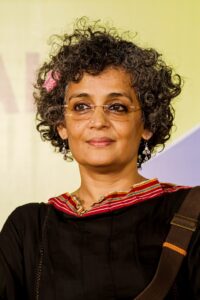Arundhati Roy Biography and Works.

Born on November 24, 1961, Arundhati Roy is an Indian novelist, activist and a world citizen. She won the Booker Prize in 1997 for her first novel, The God of Small Things.
Roy was born in Shillong, Meghalaya and spent her childhood in Aymanam in Kerala. She came to Delhi at the age of Sixteen and embarked on a homeless lifestyle. She stayed in a small hut with a tin roof.
After she won the Booker Prize, she has concentrated her writing on political issues including – India’s Nuclear Weapons, the Narmada Dam project, Dabhol Power Company activities in India.
In response to India’s testing of nuclear weapons in Pokhran, Roy wrote The End of Imagination. In her collection, The Cost of Living, she also crusaded against India’s massive hydroelectric dam projects in Maharashtra, Madhya Pradesh and Gujarat.
Roy has devoted herself solely to non-fiction and politics, publishing two more collections of essays. She has also worked for social causes.
She was awarded the ‘Sydney Peace Prize’ in May 2004 for her work in social campaigns.
She took part in the ‘World Tribunal’ on Iraq in June 2005. She was awarded the Sahitya Akademi Award for her collection of essays, ‘The Algebra of Infinite Justice’ in 2006, but declined to accept it.
She has been in many controversies due to her comments and articles on several issues.
Most recently, in August 2011, Roy accused Anna Hazare in a newspaper article of being non-secular.
Trivia
She studied architecture at the Delhi School of Architecture, where she met her first husband, the architect, Gerard Da Cunha.
- What is meant by Database Management System?
- Discuss the advantages and drawbacks of database.
- What do you mean by database ? Discuss its Characteristics.
- What is Data Mining?
- What are the conditions of communication?
- What do you mean by business communication ?
- organization / Differentiate between classical and modern theory of organization
- What is forecasting






